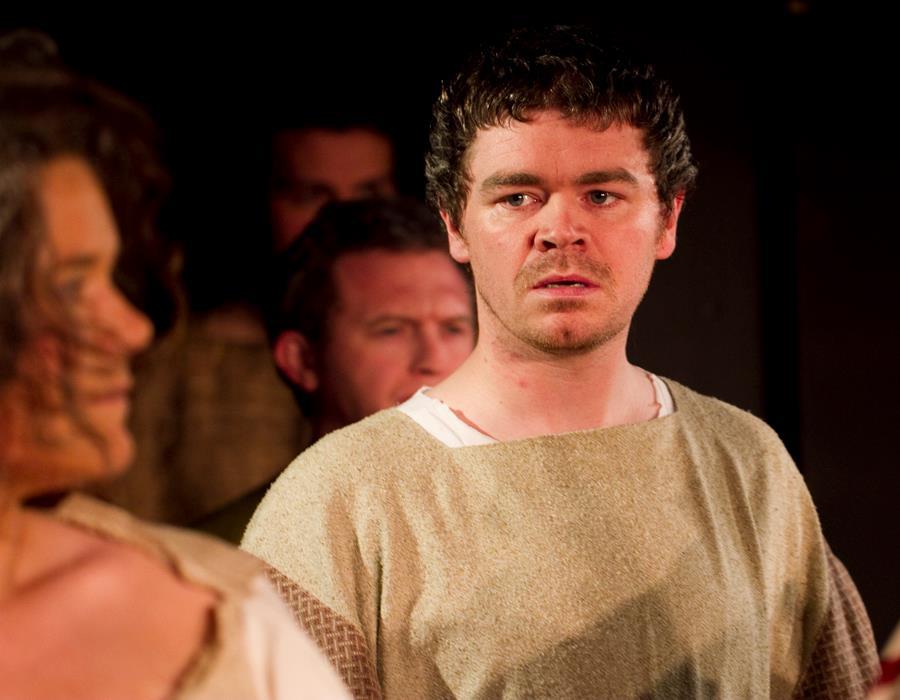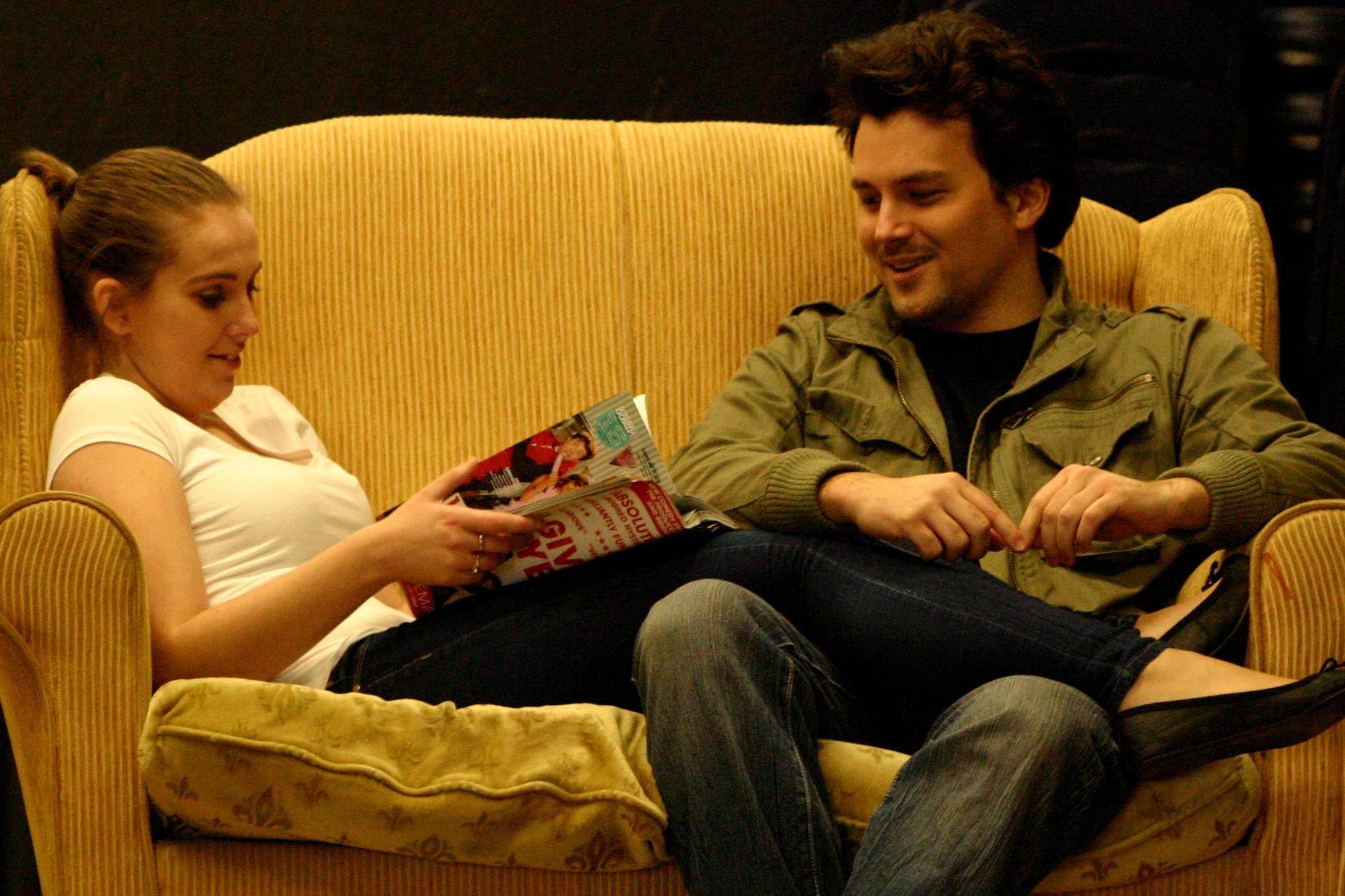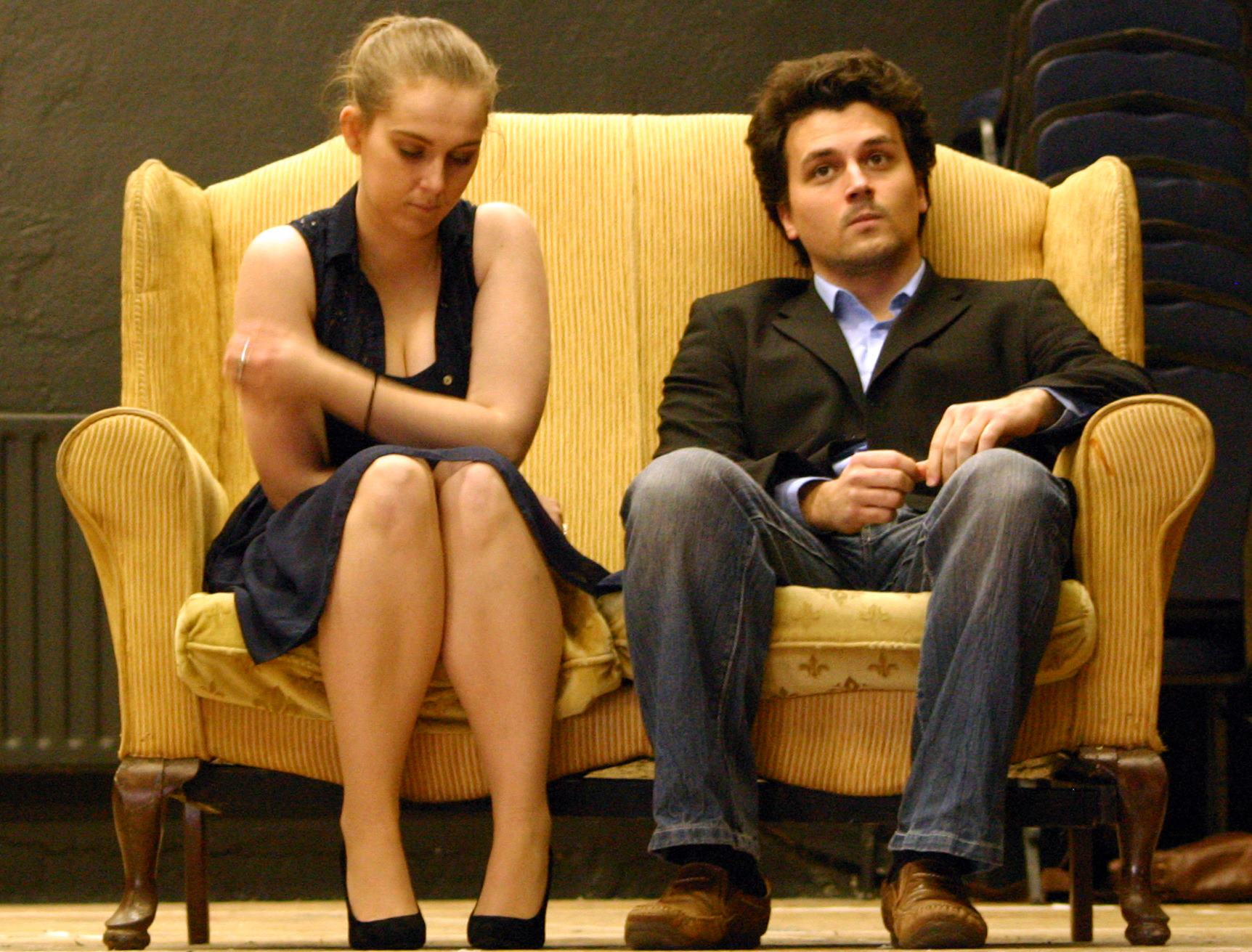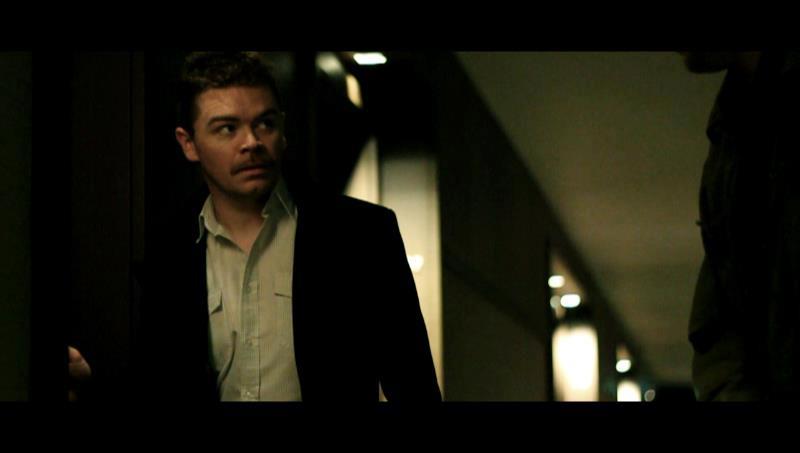Starting our new section on modern storytellers we have an interview with award-winning actor and genuinely talented writer Allan Clarke. Acting in, and directing his new play “Trinity”, I managed to snag some of Allan’s time to ask him a couple of questions about writing, acting and about “Trinity” itself.
Tell us a little bit about yourself…
About myself, always a tricky one…. I practice as a psychotherapist, I’m entering 3rd year of my degree. Not too far to go now. I think that helps a lot with acting and directing, it’s great to get into the psychology of the characters with the actors. Then I think being a good actor and being a good therapist comes down to the same thing - listening and picking up subtleties. All good acting is, is reacting. Listening, and reacting. I’m a Buddhist, wasn’t at the time I wrote the first draft of Trinity in 2010, or Fr, My Father. I teach meditation and mindfulness classes as well. So living life as a Buddhist helps with being a psychotherapist, and being a psychotherapist helps with being an actor and writer.
So which comes first then - the acting or the writing? Can you say which you prefer?
As I started out first as an actor, I suppose I think of myself as an actor who likes to write. But I think I’m drifting more toward being a writer who likes to act now. I’m inspired by the likes of Ben Affleck & Matt Damon, writing parts that they wanted to do. They did Good Will Hunting like that when they were still struggling for parts. The first thing I ever wrote was Just Ask Me, the short film on which Trinity is based. I wrote it so myself and a friend would have something to do together. So I suppose when I’m writing I’m thinking as an actor, I try to write every character as if it was a part I’d like to play myself. So hopefully every actor can be passionate about every part.

In terms of which I prefer - It sort of depends which I’m doing. As an actor you can’t beat two actors in the moment on stage. No acting, just “being”, real emotions, a completely organic experience, “in the moment” as the cliché goes. However while writing it’s wonderful to give life to characters I’ve just plucked out of my head. As an introvert, I enjoy the solitude of writing. Throw on some classical music and hit the keys on the laptop. I never know where it will go. I try to write dialogue as real as possible and let a natural conversation between the imaginary characters develop. A couple of times I’ve written things that made me well up while I was writing them. Complete imaginary situations but I think the empathy of being a therapist goes into overdrive. Empathy is very important as an actor, to be able to put yourself into the shoes of that character and feel their feelings.
You’ve won a couple of awards in your time such as the “Best Actor in the 2012 All Ireland Confined Drama Finals”. Do you have a favourite award or an award that meant the most to you at the time?
The first award I won was special for me. I won it for playing Fr. Welsh in Martin Mc Donagh’s “Lonesome West” a few years back. It’s a supporting role but I won Best Actor in Ballyshannon. It was the 4th or 5th show I think we did on the festival circuit. The other shows the other actors in the show were winning awards and I was hopping from one foot to the other changing my performance depending on what each adjudicator was saying. I wasn’t confident enough as an actor and I thought “well these guys are professional directors or actors they must know what they are talking about”. So one adjudicator would suggest doing this, the next doing that and I was coming off stage annoyed because I wasn’t doing what I thought was right, I was doing what they told me to do. I was doing what they were saying hoping I’d win an award, and of course thus be validated as “you’re a good actor, here’s an award”. So before the show in Ballyshannon I made the conscious decision to just play the part as I wanted to play it and not worry about trying to win an award, at least I could come off stage feeling happy with myself, and let the chips fall where they may. I came off stage happy with myself and it seemed to work because the adjudicator gave me Best Actor and I won more awards after that. That was one of the biggest lessons I learned - to trust myself as an actor, to trust my instincts, to do what I feel is right. It’s like the existentialists talk about being genuine, being true to who you are.
That was one of the biggest lessons I learned - to trust myself as an actor, to trust my instincts, to do what I feel is right.
Then winning Best Actor at the All Ireland Finals in 2012 was an accomplishment I was very proud of. To qualify for the All Ireland’s, winning awards along the way and then to go on to win the big one was great! I came off stage knowing that I gave my all so I was happy with my performance. Thankfully it was enough to win. When I look at the various awards in my home, that has a special place in my heart, added to the fact that it’s a beautifully designed piece. An abstract of an actor taking a bow.
The play “Trinity”, which you wrote and have directed, amongst other things, deals with a topic that many in Ireland still grapple with - religion and its role in our lives. Not to give any of the brilliant plot away but how has it been received?
Brilliantly thankfully and thank you for the kind words! To be honest I was concerned how it would be received, when you mention anything outside of the accepted view of Catholicism or Christianity people don’t want to hear it, it’s blasphemy! I think especially given who the character claims to be in the play saying things which are anti-church or anti-bible was risky for me. As I played the part on stage I would be very conscious of “Jesus, how are they going to react when I say this line.” Thankfully the audiences always laughed. They all commented afterwards the fact that it was done with humour and got the message across without forcing it down their throats. I was so grateful that came across. People were saying how the play stuck with them. How it really made them think and how rare it is to see something that actually challenges you to question how you live your life.
Most of us have been brought up through Christian schools and we’re taught to believe what we’re told and not question any of it. But I think that will drive people away. The dogmatism will cause people to rebel. The Biblical quotes in the play which are worked into the dialogue are mostly all taken from Gnostic Gospels and I researched a lot so I had a lot of “facts” while writing. I just wanted to try to say to people there’s an alternative message. What people don’t realise is that the Gospels weren’t actually written by the Apostles or even at the time Jesus was alive, then all the “agreed upon” Gospels that compose the Bible were a few hundred years after. You have to wonder what was left out. The Gnostic Gospels/Dead Sea Scrolls are pro-human, pro-God & Jesus, but anti-establishment. You have to remember that for his time, Jesus was a rebel!
What about the other themes that the play deals with?
The play also deals with sexuality and human relationships. The whole point of the play is that it is kind of two different plays. There’s the “human” side of the story with Adam & Eve(lyn) and Lucy(fer) representing temptation but there’s the religious aspect and the morality aspect. We’re lead to believe that this cosmic game of good and evil and ultimate judgement is played out in every aspect of every person’s life. The Christian view is that eternal redemption or damnation is dependent on what we do in our lives all the time, that it’s all part of some big plan. Every one of us is a character in the large cosmic play. So what I did was, I made that “invisible” side visible and I put it on stage.

Whats next for Trinity?
I actually just cast someone this evening in the role of Evelyn. We were limited in the first run of the show as Niall (Niall Murphy) who played the lead male role of Adam in the play found out late into rehearsals that he was moving to London so that limited the run we could do. Everyone that had seen it or that was involved on or off stage said it deserved to be seen and keep going with it. I’ve been offered a space in London to perform it and at the moment I’m weighing up the logistical side of that. But whether it hits London or not, it will be back on stage here in the next few months with a brand new cast which I’m very excited about. It’s a hard decision thinking “with people having to drop out due to life commitments is it worth recasting?” or thinking “I believe in this play, it’s my baby and I’m determined to get it out there.”
One of the almost tenet’s of writing seems to be “Write what you know”. Do you find yourself falling back on personal experiences at all - or do you try to avoid that?
I very much write about what I know, there is a lot of soul searching in my plays. In Trinity people asked was I Adam. But Adam, Evelyn and Lucy are all different aspects of my personality. At one time in my life I was probably each one of the characters, Evelyn chases after Adam, Adam chases after Lucy, Lucy chases after…
Being an introvert and being a therapist I’m always trying to better understand my behaviour, so some characters are projections of myself and some are as Jung would say my projections of my “shadow”, my “dark side”.
…some characters are projections of myself and some are as Jung would say my projections of my “shadow”, my “dark side”.
In Gabriel’s Flight, the lead female character Sarah while writing it I thought “I’ve just wrote my ideal woman”. Jung would say that was the manifestation of my archetypal “anima”, the female side of my self. Gabriel’s Flight was my most personal play to write to date. Having been single for a while I put directly some of the funny (after the fact) dates I was on directly into the play. So most of the dating stories Gabriel tells are my own. The emotions and love expressed between Gabriel & Sarah are emotions I would have felt in a previous relationship. They’re not carbon copy conversations but the core of them are me. Gabriel’s Flight ended my “Unholy Trinity”, that’s my trilogy of religious themed plays.
I’m working on a new play at the moment and I can honestly say I’m putting my heart and soul into it. There’s no research involved like there was for the other 3 plays so I can just write. I can just put it all down on the page. There’s a break up scene in it and while it’s a little dramatized it’s almost exactly how my last relationship ended. I sent it on to someone and they said “I’ve either witnessed break up scenes like that, or been a part of them, it’s so real”. In my head I was thinking - you have no idea just how real it is. But that’s the great thing about being a writer, it can be cathartic. The Dementors in Harry Potter are symbolic of JK Rowlings depression at the time of writing. She’s aware of that. Whether conscious or unconscious, I think the writer always puts something of himself into any piece of writing.

One of my favourite moments when Trinity was on stage, there’s a scene between Adam & Evelyn and as the writer I was watching the audience for their reaction, there was a couple in the audience and the woman elbowed her partner and I could see her saying to him “That’s you! You do that!”. It’s great to see that people can relate to the writing. Real recognises real I suppose.
One of things I’ve always found it hardest about writing are characters that I don’t like. What’s the hardest part of writing for you?
I like writing characters I don’t like, I find it challenging to make them likeable. But then again I get to name characters I don’t like after people who have done things to me that I don’t like! It’s not wise to cross a writer because we will eternalise you, for the wrong reasons. Lucy in Trinity is the archetypal “bitch” I suppose, but then there’s the phone monologue with her mother and all of a sudden we switch to empathising with her and understanding why she is the way she is. That’s my favourite scene in the play now. I like playing characters I don’t like. They’re more interesting than the “good guy”. I’d rather take an interesting supporting role than a boring lead role.
It’s great to see that people can relate to the writing.
The hardest part of writing for me, I think it’s knowing when to stop. It’s when to let it go. With Trinity there was lines I’d want to add in or change but I have to accept I have to stop. I have to let it be.
Something else is I suppose is to stop being so realistic. To come back to Lucy’s monologue in Trinity, the natural dramatic conclusion to that scene is lights down, end scene and audience applaud. But in real life we don’t get that. We don’t get to cry on our own all the time, often times we’re interrupted and have to deal with other people. So poor Lucy pours her heart out to her mother and then she has to deal with Adam coming in and starting on her.
Although as a nation we’re always celebrated for our ability to produce great creative minds, the arts seem to be - in my eyes - under appreciated. Do you get a sense of that or are things looking up?
No I think you’re absolutely right. To be perfectly honest at times I’m guilty of it myself. I’ve thought “what is the point of this, people are struggling, some people can barely afford to eat”, but then I think “that’s exactly the point!”
Art … is escapism for some people.
The first play I ever did “The Normal Heart”, won the All Ireland finals. The group being based in Kildare got to meet President McAleese as she was opening the 50th Drama Festival in Kildare Town. I got to chat with her briefly and as I was introduced to her I said something flippant like “I’m just a mere actor” as she’d met all these other “dignitaries” and she said “No! God bless you, you take people away from their lives if only for a few hours.” That always stayed with me.
Art, however much reality based in my case, is escapism for some people. They can forget their bills, their relationship troubles, their job for the few hours sitting in a theatre, a cinema, a concert. It’s like TS Elliot wrote “You are the music, as long as the music lasts.” Whether people realise it, that is meditation, that is mindfulness, being fully immersed in whatever they are experiencing and not worrying about other things. I take that responsibility very seriously. I always give 100% of myself on stage, not just because it’s the standard I set for myself but because the audience deserve it. I’ve done shows in front of sold out theatres, I also did a show once to 6 people! Those 6 people deserved my best as much as the couple of hundred.
Art is important, no matter the medium, now more than ever. The soul needs it! We never know the impact any one of us can have on another person. I made up imaginary characters and stories in Trinity and that was enough to make an audience laugh and cry. People need it, we need it.
One of the hardest things for people to do in their jobs is deal with criticism - harder still when that criticism is made public as is often the case with the performance arts. How do you deal with that?
People don’t really realise how exposed artists are. People can decimate your work and I don’t think any other profession is under that kind of scrutiny. No one looks at the plumber fitting a toilet or an electrician putting in a light and then puts it online or in a newspaper criticising every aspect of their work. As an artist you lay your soul open and it’s exposed for people to stick the boot in. You can’t tell me that doesn’t take courage.
Good acting, is not acting - it’s being.
I’ve been very privileged as an actor in that people have always spoken highly of my acting. Every adjudication I’ve had in festivals have been almost always positive. Trinity competed in 2 festivals this year and I won Adjudicator’s awards for writing on both occasions. But then again, when I did The Good Father, for which I won the Best Actor award at the All Ireland finals, in 7 festivals I won Best Actor I think 5 or 6 times, on more than one occasion I won 2 awards on the night but then in one festival one adjudicator didn’t even nominate me! It’s very hard to argue against good acting, but clearly that adjudicator thought differently. Should I focus on the one guy who didn’t like what I did or all the other adjudicator’s who did like what I did, or the hundreds of audiences members who thanked me afterwards?
 The actor gets up on stage and if they cry real tears, experience real anger etc it will resonate with an audience and it’s very hard to not say it wasn’t good “acting”. Good acting, is not acting - it’s being.
The actor gets up on stage and if they cry real tears, experience real anger etc it will resonate with an audience and it’s very hard to not say it wasn’t good “acting”. Good acting, is not acting - it’s being.
Writing, on the other hand, is subjective… People will have different views on what good writing is. One person might look at Trinity and think “It’s just a play about sex”, another might see it and think “it’s just a play about religion and morality” and both of those people might think neither of those things interest them. They might not get the message I was trying to get across. They might see “Fr, My Father” and think it’s “pro gay” or “anti church” missing the fact that it’s just a story based around a father and son. The son just happens to be gay and the father just happens to be a priest.
So in terms of being an artist and dealing with criticism I think the most important thing is to be true to yourself. Believe in yourself. Nietzche talks about the difference being a “noble” and being a “slave”. You have to live your life as a noble, outside of the herd, being authentic and true to who you are. Is it better to try to please the masses or yourself? Is it better to be a real nobody or a fake somebody? You’re the one that has to live with your own conscience, at least be true to who you are and your vision.
Where can we see you or your work next?
It will probably be in Trinity again in terms of acting. Whether I play Adam or “The Man” remains to be seen but rehearsals are going well either way. Having new blood has given new enthusiasm. After Trinity I would like to do Gabriel’s Flight, just as an actor. It’s too much to take on directing, producing, designing posters, music and the other various roles I had to take on for Trinity. I’d like to just act. Learn lines, rehearse, get on stage, get off stage, go home.
With my writing work, I hope to get it out into the world as stand alone entities without me as an actor attached. To start to make the transition to writer and have other people produce my work. Ω
To find out more about Allan’s work check out his website Allanclarke.ie and you can follow him on twitter twitter.com/allanclarke for updates about upcoming shows. I absolutely recommend you try and catch Trinity if you can - it’s an excellent play.